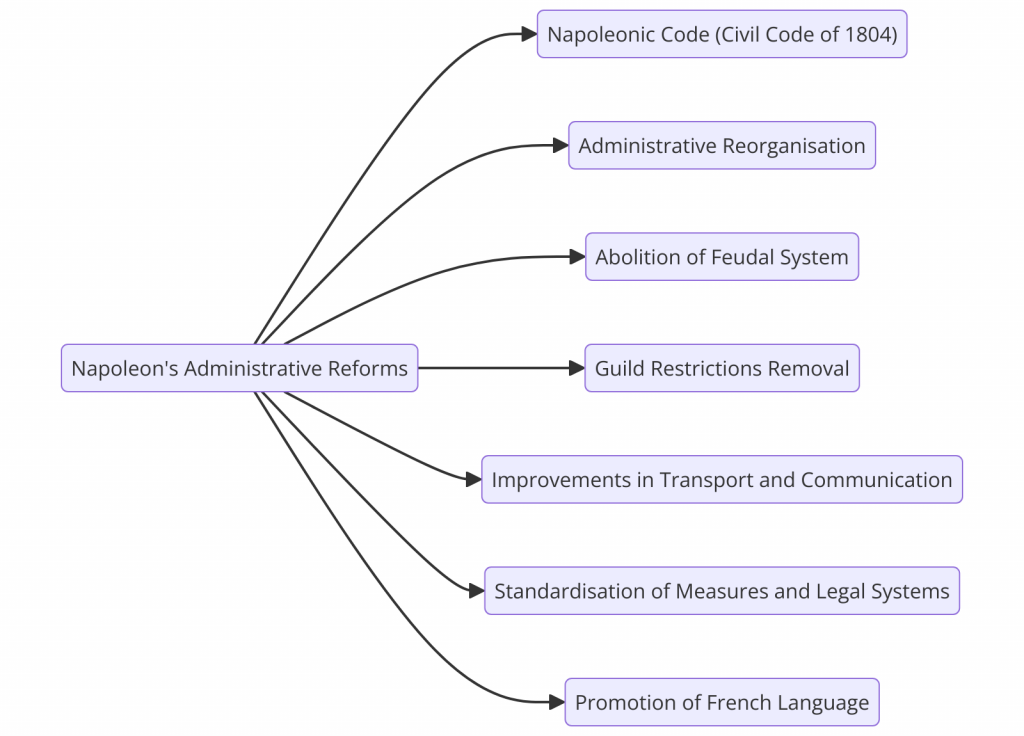Napoleon introduced several administrative reforms in the territories he ruled to enhance efficiency and rationalise the system. These reforms were grounded in the principles of the French Revolution and aimed at creating a unified, efficient administrative structure across the vast expanse of the Napoleonic Empire. Here’s a concise overview of the key changes Napoleon implemented-

- Napoleonic Code (Civil Code of 1804)- This comprehensive set of laws abolished privileges based on birth, established equality before the law, and secured property rights. It was a cornerstone in Napoleon’s administrative reforms and was implemented not only in France but also in territories under French control.
- Administrative Reorganisation- Napoleon simplified the complex and varied administrative divisions across his empire, making the system more uniform and, therefore, more efficient. This standardisation facilitated better governance and control.
- Abolition of Feudal System- In territories under his rule, Napoleon abolished the feudal system, which was a significant step towards modernising these regions. This move freed peasants from serfdom and manorial dues, aligning with the revolutionary principles of freedom and equality.
- Guild Restrictions Removal- In urban areas, Napoleon removed guild restrictions, which was a significant reform that liberated the economic activities of artisans and workers, fostering a more dynamic and competitive business environment.
- Improvements in Transport and Communication- To enhance economic efficiency and military mobility, Napoleon invested in the development of the transport and communication infrastructure. This not only facilitated the swift movement of troops but also boosted trade and commerce.
- Standardisation of Measures and Legal Systems- Under Napoleon, a uniform system of weights and measures was adopted, and uniform laws were applied throughout the empire. This standardisation was crucial for the efficient administration of a diverse and expansive empire.
- Promotion of French Language- To foster a sense of unity and facilitate administration, the use of regional dialects was discouraged, and French, as spoken and written in Paris, was promoted as the common language.
Through these reforms, Napoleon aimed to create a more rational, efficient, and centralised administrative system that reflected the revolutionary ideals of equality and rational governance, albeit under his autocratic rule. These changes had a lasting impact on the territories under French control, influencing their administrative practices long after Napoleon’s fall.
The German unification, spearheaded by Prussia in the late 19th century, shifted from failed liberal revolutions to conservative dominance. Otto von Bismarck’s Realpolitik guided the process through strategic wars like the Austro-Prussian and Franco-Prussian conflicts. Culminating in 1871, the proclamation of the German Empire at Versailles marked a new era, forging a unified Germany into a major European power.
Also Check – The Role of Women in Nationalist Struggles – Short note
Also Check – The Frankfurt Parliament
Also Check – Napoleon and the Napoleonic Code- Impact on European Societies and Legal Systems
Also Check – Giuseppe Mazzini – Italian Revolutionary thinker
Also Check – Giuseppe Garibaldi- Italian freedom fighter
Also Check – Count Camillo de Cavour
Also Check – The Rise of Nationalism in Europe- 39 Mcqs
Also Check – The Rise of Nationalism in Europe – Class 10 – Notes
Also Check – Otto von Bismarck- Architect of German Unification
Also Check – Briefly trace the process of German unification
